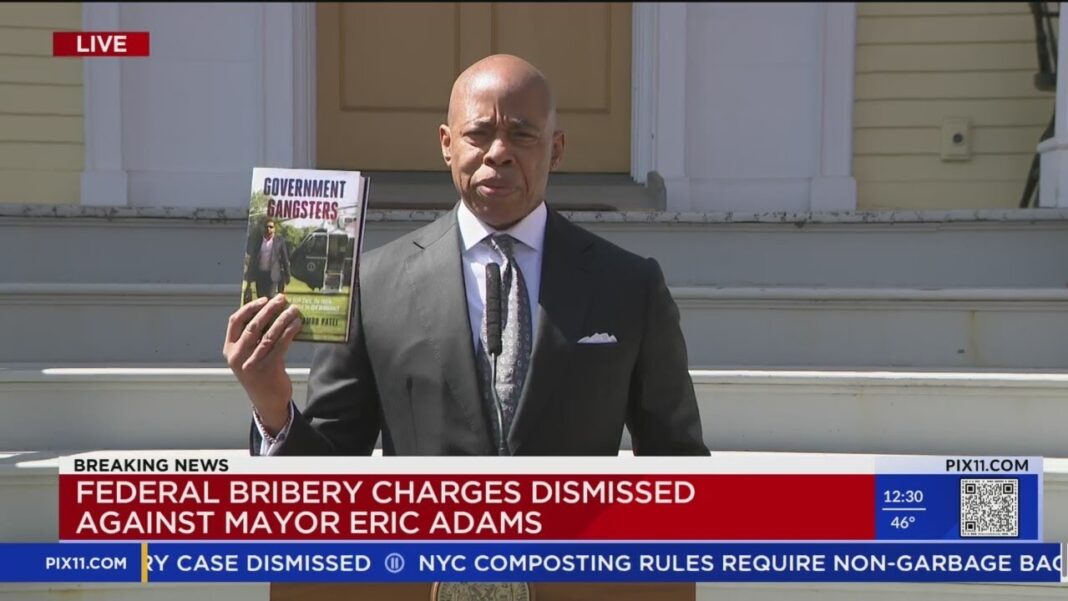|
Getting your Trinity Audio player ready...
|
After Corruption Case Dismissal, NYC Mayor Eric Adams Cites Book on “Deep State” as Personal Inspiration
Edited by: TJVNews.com
In his first public remarks following the dismissal of the corruption case against him, New York City Mayor Eric Adams took an unexpected turn—crediting not only his legal team, but also a controversial political book for helping him endure what he described as a months-long ordeal. The mayor, speaking outside Gracie Mansion on Wednesday, held up a copy of ‘Government Gangsters: The Deep State, the Truth, and the Battle for Our Democracy’ by Trump administration FBI Director Kash Patel, telling New Yorkers it had given him clarity and strength during one of the most challenging periods of his political career.
The striking visual—Adams raising the book before the cameras—was not lost on reporters and bystanders. As VIN News reported on Wednesday, the mayor described the book as essential reading for every American who wants to understand “how we can never allow this to happen to another innocent American.”
Adams’ public address came just hours after formal confirmation that the corruption case levied against him had been dismissed. Though the details of the allegations and legal maneuverings were not discussed during the press event, the VIN News report noted that the mayor took a moment to thank his defense attorney Alex Spiro, as well as the broader legal team that helped him navigate the process.
“I have nothing but gratitude for the people who stood by me,” Adams said, visibly relieved. “My family, my lawyers, my community.”
But the central message of the day was not just vindication—it was warning.
Adams’ decision to hold up ‘Government Gangsters shocked many political observers. The book, known for its strong denunciation of the “deep state” actors within government, argues that powerful bureaucracies work behind the scenes to manipulate political outcomes and subvert elected leaders.
According to the report on VIN News, Adams said the book gave him a framework through which to view his own experiences. While he stopped short of endorsing all its claims, his message was clear: the sense of being targeted and undermined by hidden institutional forces had deeply resonated with him.
“For months, I knew something wasn’t right,” Adams said. “Reading this book gave me language for what I was feeling. I urge every New Yorker to read it—not to agree with everything in it, but to understand the bigger picture. We have to be vigilant.”
Despite the turbulence, Adams appeared both defiant and confident about his political future. “I will win re-election,” he stated unequivocally, according to the information in the VIN News report. “Now that the legal cloud over me has been lifted, I’m more determined than ever to keep delivering for this city.”
VIN News reported that Adams’ base—particularly in working-class and minority communities—has remained largely loyal throughout the legal saga. But the broader political landscape may now shift as voters begin to evaluate not just his record on crime, housing, and infrastructure, but also the way he positions himself in relation to the national political discourse on government accountability and institutional trust.
The choice of ‘Government Gangsters’ as a symbolic centerpiece raises important questions. The book is widely viewed as a partisan critique of the federal government and its intelligence and law enforcement arms. Patel, the author, has frequently appeared on conservative media outlets to discuss systemic bias within federal institutions.
By aligning himself, even partially, with the book’s themes, Adams may be signaling a more confrontational posture toward federal oversight and internal bureaucracy—an unusual stance for a Democratic mayor in a traditionally liberal city.
Still, the report on VIN News pointed out that for Adams, the gesture appeared deeply personal, not overtly partisan. His message was less about left versus right, and more about citizen versus system.
As the dust settles from the now-dismissed legal case, Adams’ political resilience will be tested by the challenges that remain: skyrocketing housing costs, migrant housing debates, public safety concerns, and increasing political polarization in the city’s governance.
Yet if Wednesday’s address was any indication, Adams is not planning to retreat. He’s leaning into a narrative of redemption and resistance, and using the themes from ‘Government Gangsters’ as part of that broader story.
“Let this be a moment,” Adams told the crowd, “where we say: never again. Not just for me—but for any American who finds themselves accused, targeted, or dragged through the mud without cause.”





